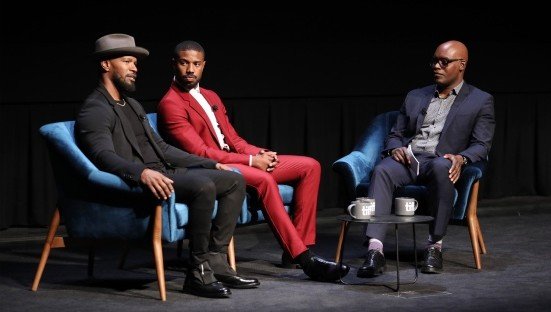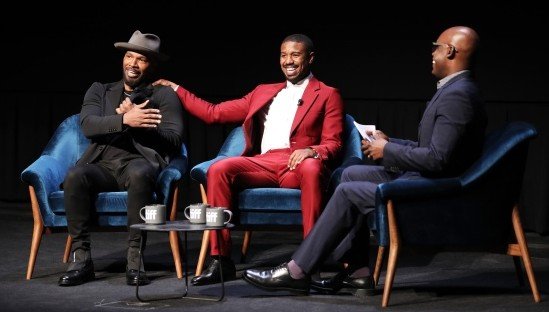
As part of the TIFF Conversation series, Michael B. Jordan and Jamie Foxx were featured with TIFF Co-Head Cameron Bailey in front of a live audience. Minority-Review’s Swati Sharan got front-row seats. The duo was in town at TIFF 2019 for the screening of their film Just Mercy. Just Mercy is based on the real-life story of a man named Walter McMillan. McMillan was wrongly accused of murder due to racist attitudes though his innocence was evident. Foxx plays him in the film while Michael B. Jordan plays his lawyer Bryan Stevenson.
Though the story is highly tragic, the conversation with these two actors could not have been more hilarious. Bailey successfully walked us through the different career points of both stars from the beginning till today.
Part of what we can attribute to the hilarity of the session is Jamie Foxx’s comedic background. His early beginnings came from watching the Johnny Carson show with his grandmother as a young kid. With Living Color as his launchpad, Foxx gradually went on to play a variety of roles including one as Ray Charles in Ray (2004). When asked about this role, the thespian recalls the experience rather animatedly. In a Ray Charles voice, he mimics, “If you can play the Blues baby, you can do anything.” He then narrates how as part of his training with Ray Charles for the role, “… We sat down on duo pianos and started playing the blues.”
Michael B. Jordan, on the other hand, made his initial foray into acting through the HBO TV show The Wire. He saw this as the training ground to see if acting was what he wanted to do in the long run. Amongst other things, Jordan touches upon his roles in Fruitvale Station, Creed and Killmonger. When asked about the process of physically transforming for roles, the actor responded: “Creed was the first time I had to change my body. I was looking forward to it to be perfectly honest. They’re going to pay me money to be in the best shape of my life. This is awesome.”

Jamie Foxx and Michael B. Jordan
The session concluded with addressing the social issues linked with the duo’s latest film, Just Mercy. As for what each of them wished to achieve through their work in this film, Jordan replied, “I think I want people to watch this movie and feel like they can be part of the change. I think criminal justice and corruption within a judicial system seems so hard and so big that individual people don’t feel like they can do anything to contribute to be a part of that movement. I’m here to tell you that it matters that you get involved and feel something.”
Foxx’s hopes for achievement were multi-dimensional. On one level, he hopes people will not become so used to racism. “It’s a weird thing being Black. We go to jail so much till we start rapping about it. It becomes a badge of honour for us. ‘Cuz we don’t know how to come together and fix it.” On another level, Foxx hopes people will be touched by the film and speak out about racial injustice.
Jordan then concluded with some progressive measures being taken for Black people in the entertainment industry. For instance, through his production company Outlier Society, he collaborated with Warner Brothers to write policies for Warner Media. He hopes this will inspire other studios to follow suit. He ultimately hopes this will open doors for Black people to work in diverse fields in the entertainment realm, which were earlier prohibitive. As a new generation gets socialised to believe in these opportunities, he is optimistic about the change in American cinema.
Watch the conversation:



0
comments